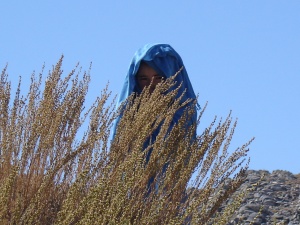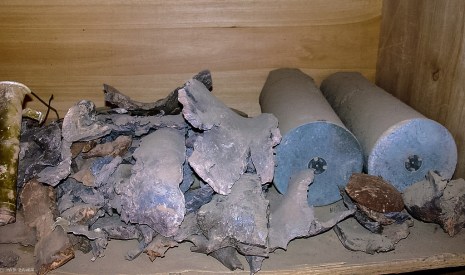Jang-e-Jawri (The Battle of Corn) took place when your aunt Aabay Esmatulla was still a baby. That’s sixty years ago, may be seventy…I am not sure, dear.
One night in the summer of that bloody year, two Hazaras from Hotqol-Anguri went to the mill at Thangi Uthla to crush the family’s grain harvest. In the darkness of the night, they were set upon by Kuchis, and killed.
At the time, the villages bordering Pashtun lands constantly guarded their hills and mountains against recurring attacks. Villagers took turns to send their men to the mountains on guard duty. The bodies of the murdered Hazaras were discovered by the guards the next morning. The news soon spread to the villages, and soon, the villagers mobilized seeking revenge.
The guards and villagers then chased down the Kuchis, and killed them.
Sayed Ismail, once a farmer in our village, had been a guard and an eye-witness. He narrated:
We went out looking for the Kuchis responsible. We spotted them in the plains just beyond the gorge. We sneaked up on their position, surrounded them, and then in a surprise attack, killed them all.
Once the rage was over, we realized we didn’t know what to do with the dead bodies. We picked up the bodies, and climbed up a narrow ridge in the nearby mountains. There, one of the locals took us to a hole in the ground. One of the guys threw a rock into it to see if it was deep enough to hide the bodies. He threw the piece of rock and it was many moments before we heard it hit the bottom. Then we picked up all the nine or ten bodies one by one, and threw them down that hole.
That wasn’t enough. There had to be more bloodbath. The killers had been done with and disposed off. We wanted to teach the Kuchis a lesson. We went out looking for the Kuchi tents. We had to walk a long way to find them out in the plains. We walked up to their tents, and found an old man there. He was afraid. He had hid his daughter under the camel saddle. We killed him, we killed all their men. We left the women and children alive. We brought with us all their cattle, and distributed them amongst people in the villages. Our group then took the road up the hills and dispersed. In the hills we found another Kuchi man hiding among the rocks. We killed him too.

Battles don’t end when the killings stops. It continues so long as the thirst for revenge is still there. When both sides want revenge, it is like the seasons of the year. It goes on forever.
The surviving Kuchi women went to the governor of Ghazni to plea for help. They cut open their breasts, and dared the governor to fight for their honor. The governor at the time was Sayed Abbass. He was powerful, and ruthless but unwell.
He sent his soldiers to speak to the Hazaras. The Hazaras denied any involvement in the massacre. The soldiers investigated. They could not find any bodies but they found out about the Kuchi cattle, which by that time had been sent deep into the mountains of Pashi and Shirdagh. The governor’s men demanded compensation for the cattle. All the Hazaras of Jaghori had to contribute wheat and other harvest to the villages of Hotqol Anguri to help them pay off the compensation.
When the men returned to Ghazni, Sayed Abbass vowed revenge, and swore to crush the Hazaras as soon as he recovered from illness. He instructed his men to be battle ready.
Sayed Abbass never recovered. His illness prolonged. He died before he could attempt to fight any battles.
They call it the Corn-War/Jang-e-Jawri. I don’t know why because it had nothing to do with corn.
*Aabay = Mother as in Aabay Estmaulla = Esmatullah’s Mother
*Jang = Fight/War/Battle as in Jang-e-Jawri = Battle of Corn
*Jawri = Corn
*Thangi = Gorge as in Thangi Uthla = Uthla Gorge




